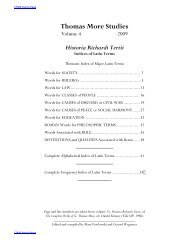life of john picus earl of mirandola - The Center for Thomas More ...
life of john picus earl of mirandola - The Center for Thomas More ...
life of john picus earl of mirandola - The Center for Thomas More ...
You also want an ePaper? Increase the reach of your titles
YUMPU automatically turns print PDFs into web optimized ePapers that Google loves.
[74]<br />
Punishment desired <strong>for</strong><br />
a godly intent<br />
24 <strong>Thomas</strong> <strong>More</strong>’s Life <strong>of</strong> John Picus<br />
⌐ Of the State <strong>of</strong> his Soul. ¬ ⌐ After his death (and not long after) ¬<br />
Jeronimus, 1 a Friar Preacher <strong>of</strong> Ferrara, a man as well in cunning as<br />
holiness <strong>of</strong> living most famous, in a sermon which he rehearsed in<br />
the chief church 2 <strong>of</strong> all Florence, said unto the people in this wise¦:<br />
“O thou city <strong>of</strong> Florence, I have a secret thing to show thee which is<br />
as true as the gospel <strong>of</strong> Saint John¦. I would have kept it secret but I<br />
am compelled to show it, <strong>for</strong> he that hath authority to command me<br />
hath bid me publish it. I suppose verily that there be none <strong>of</strong> you<br />
but ye knew John Picus, Earl <strong>of</strong> Mirandula, a man in whom God had<br />
heaped many great gifts and singular graces¦: the Church had <strong>of</strong> him<br />
an inestimable loss, <strong>for</strong> I suppose if he might have had the space <strong>of</strong><br />
his <strong>life</strong> prolonged he should have excelled (by such works as he should<br />
have left behind him) all them that died this eight hundred years be<strong>for</strong>e<br />
him. He was wont to be conversant with me and to break to me the<br />
secrets <strong>of</strong> his heart: in which I perceived that he was by privy inspiration<br />
called <strong>of</strong> God unto religion. Where<strong>for</strong>e he purposed <strong>of</strong>tentimes to<br />
obey this inspiration and follow his calling. Howbeit, not being kind°<br />
enough <strong>for</strong> so great benefices <strong>of</strong> God, or called back by the tenderness<br />
<strong>of</strong> his flesh (as he was a man <strong>of</strong> delicate complexion) he shrank<br />
from the labour, or thinking haply that the religion had no need <strong>of</strong><br />
him, 3 deferred it <strong>for</strong> a time; howbeit this I speak only by conjecture.<br />
But <strong>for</strong> this delay I threatened him two years together that he would<br />
be punished if he <strong>for</strong>slothed° that purpose which our Lord had put<br />
in his mind. And certainly I prayed to God myself (I will not lie there<strong>for</strong>)<br />
that he might be somewhat beaten to compel him to take that<br />
way which God had from above showed him. But I desired not this<br />
17 kind grateful / 23 <strong>for</strong>slothed neglected<br />
¦ 4 At this point <strong>More</strong> omits several lines <strong>of</strong> the Latin in which Gianfrancesco warns against<br />
the “crude ears and obstinate hearts” <strong>of</strong> those who may consider incredible what he is about<br />
to relate (CW 1:335). / 6 <strong>More</strong> omits proverbium illud apud te frequens, rendered by Miller as “so<br />
frequently on your lips” (CW 1:334, 335). / 10 <strong>More</strong> omits multifariaque preditus disciplina fuerat.<br />
Nulli <strong>for</strong>te mortalium tam celebre obtigit ingenium, “and he was furnished with learning <strong>of</strong> many kinds.<br />
Perhaps no mortal has ever had such an illustrious intellect” (CW 1:334, 335).<br />
1. Jeronimus: Girolamo Savonarola (1452–1498).<br />
2. in the chief church: That is, the Duomo. <strong>The</strong> Latin reads in aede sacra quae Sanctae Reparatae dicitur,<br />
“in the church called Santa Reparata” (CW 1:334, 335).<br />
3. thinking…him: According to Edwards, “<strong>More</strong> mistranslated ‘arbitratus eius opera religionem indigere’...<br />
(‘thinking that the religious <strong>life</strong> needed his [literary] endeavors’) by inserting a negative (‘had no<br />
need <strong>of</strong> him’). Gianfrancesco presumably implied by this phrasing that entry into the religious<br />
<strong>life</strong> would interrupt or preclude Picus’ scholarly endeavor (‘opera’)” (CW 1:227).<br />
5<br />
10<br />
15<br />
20<br />
25











